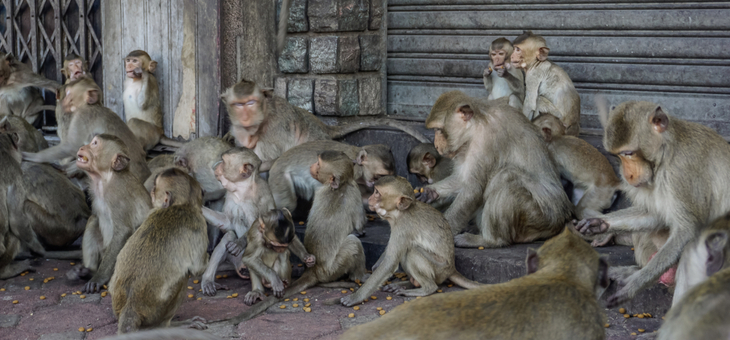Lopburi is an 800-year-old city in central Thailand. It’s famous for its temples, rock formations and sunflower fields – oh, and the marauding gangs of monkeys that have terrorised the streets since the pandemic struck.
Prior to the outbreak of coronavirus, tourists flocked to Lopburi to photograph and play with the monkeys that call the city home. However, the monkeys grew dependent on the symbiotic relationship they had with the tourists, exchanging their presence in – admittedly adorable – selfies for fruit and sweets.
The monkey population has boomed in recent years, largely due to the abundance of sugary foods provided by tourists. Pramot Ketampai, who manages the city’s Prang Sam Yod temples, noted, “The more they eat, the more energy they have … so they breed more.”
The monkeys have now found themselves overpopulated, overcrowded and out of food. They have been wreaking havoc on the city’s residents ever since the tourists stopped visiting earlier in the year. Locals have been forced to barricade themselves inside their homes. Those who do go outside risk being attacked or mugged by gangs of monkeys. Some residents have even been forced out of their own homes after monkey invasions.
The primates break windows, damage cars and steal groceries. “We live in a cage, but the monkeys live outside,” said Kuljira Taechawattanawanna, a resident of Lopburi. “Their excrement is everywhere; the smell is unbearable, especially when it rains.”
The absence of food has driven the monkeys to fight for turf in the city. Monkeys living at the Prang Sam Yod temples launched an attack on the monkeys living at the Phra Kan shrine earlier this year. Footage of this attack went viral, as the warring monkeys stopped traffic as they screeched and battled on the roads.
The monkeys have reportedly taken up residence in an abandoned cinema. They use the projection room as a makeshift graveyard, where they lay their dead to rest.
Veterinarian Supakarn Kaewchot said: “They’re so used to having tourists feed them and the city provides no space for them to fend for themselves.
“With the tourists gone, they have been more aggressive, fighting humans for food to survive,” she said. “They are invading buildings and forcing locals to flee their homes.”
Finally, authorities have decided to step in. The wildlife department has restarted a sterilisation program. They use fruit to lure monkeys into cages, then take them to a clinic where they are anaesthetised and sterilised. These monkeys are then given a small tattoo to mark them as desexed.
Have you posed for photos with monkeys on your travels? What do you think will happen to the monkeys living in Lopburi?
If you enjoy our content, don’t keep it to yourself. Share our free eNews with your friends and encourage them to sign up.
Related articles:
https://www.yourlifechoices.com.au/travel/news/tigers-extinct-within-a-decade
https://www.yourlifechoices.com.au/travel/news/aussies-now-allowed-european-entry
https://www.yourlifechoices.com.au/health/covid19/covid19-are-bats-to-blame

